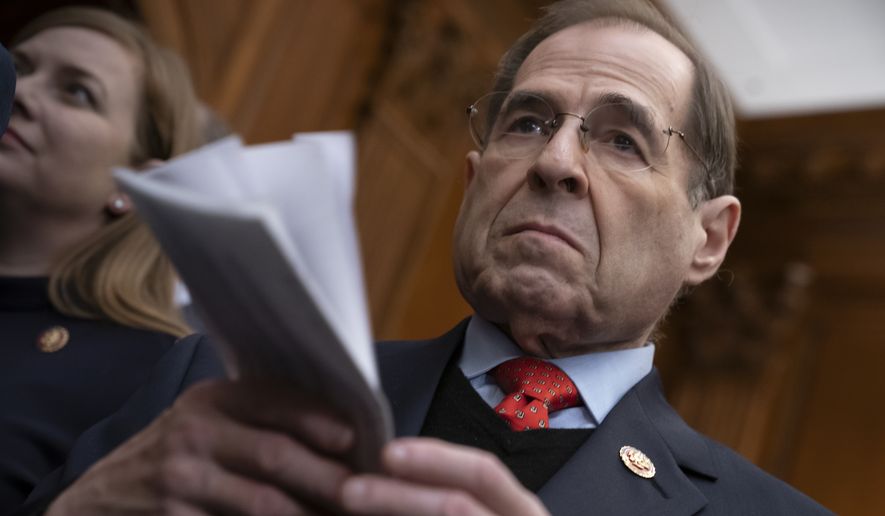House lawmakers will return to the Capitol from a lengthy summer vacation to find that they are already in the midst of an impeachment inquiry against President Trump.
They have taken no vote on the matter, but Judiciary Committee Chairman Jerrold Nadler, New York Democrat, has repeatedly told federal judges in recent weeks that it’s exactly what he is doing as he investigates Mr. Trump’s behavior toward Russia and suspected efforts to thwart FBI and special counsel investigations.
Mr. Nadler has also fired off a round of subpoenas to set up a showdown hearing on Sept. 17. He has demanded the presence of several former top Trump aides that, according to the special counsel’s report, were involved in efforts to thwart the investigations.
The aggressiveness is all the more surprising given Mr. Nadler’s July hearing with former special counsel Robert Mueller, which was widely panned as so empty that it doomed any chances of impeachment.
Still, House Democrats are committed to the idea that Mr. Trump is impeachable.
Support for the idea has grown during lawmakers’ six-week recess. More than half of the Democratic caucus has publicly supported starting an impeachment process, and about 40 have agreed since Mr. Mueller’s hearing.
“It certainly seems like if, when they come back in September, the Democratic majority fully embraces this shift, then that will be a significant political event. It’s a factual statement to say they’ve been kind of sidling up to this somewhat reluctantly for a while,” said Paul Rosenzweig, a senior fellow with the R Street Institute who worked with Kenneth W. Starr during the Whitewater investigation of President Bill Clinton.
Standing against that momentum is House Speaker Nancy Pelosi, California Democrat, who has welcomed the battle in court over documents but has cautioned against beginning impeachment proceedings until the public is ready.
So far, the public is not ready. Polling on support for impeachment has not moved since Mr. Mueller testified.
Mr. Nadler last month defended his aggressive approach.
“This is formal impeachment proceedings,” he told CNN. “We are investigating all the evidence, gathering the evidence. And we will [at the] conclusion of this — hopefully by the end of the year — vote to [send] articles of impeachment to the House floor. Or we won’t. That’s a decision that we’ll have to make. But that’s exactly the process we’re in right now.”
Legal analysts said Mr. Nadler is making arguments in courts to try to persuade judges to grant him access to the documents and witnesses he is seeking.
Mr. Rosenzweig said courts have ruled that Congress has much more leeway on matters such as trying to get grand jury information when lawmakers are engaged in impeachment proceedings as opposed to normal congressional oversight.
Rep. Doug Collins of Georgia, the ranking Republican on the Judiciary Committee, said Democrats are pursuing impeachment without taking the hard votes required to begin an official inquiry.
He fired off a letter to Mr. Nadler last week saying conflict is already apparent. Mr. Nadler announced that he would limit access to the materials the committee gleans during its impeachment investigation to its members, but Mr. Collins said that can happen only if the House votes to begin impeachment proceedings.
“You lack the procedural authority to prohibit non-committee member access to committee records, because the full House has not voted to initiate an impeachment inquiry or to allow you to limit such access,” Mr. Collins wrote.
Mr. Rosenzweig said the committee has moved beyond hearings with academics debating the merits of impeachment and instead has called primary witnesses such as former White House counsel Don McGahn and former Communications Director Hope Hicks.
“The shift in tone is also a reflection in shift in focus away from laying the legal groundwork and towards doing the factual digging into what exactly happened and then obviously what that means,” he said.
Mr. Nadler last week suggested another reason for impeachment based on Mr. Trump’s suggestion that next year’s summit of the Group of Seven leading industrial nations be at Doral, his Miami golf resort.
Some analysts say Mr. Trump appears to be trying to siphon business to his properties, which could leave him at odds with the Constitution’s prohibition of a president accepting any emolument from foreign governments or enriching himself beyond his U.S. government salary.
Notably, Democrats are expanding the rhetoric around impeachment beyond issues in the Mueller report because that is the nature of removing a president from office.
“In some ways, if you’re in for a dime, you’re in for a dollar with the impeachment thing,” said Steven Schwinn, a professor at the John Marshall Law School.
He said the committee’s work on impeachment is not any different from regular oversight but added that the change in rhetoric may have some political impact.
“To Democrats’ base and those that favor impeachment, it shows that Democrats are finally getting serious about impeachment. To those in President Trump’s base, it shows a gross overreach of Congress,” he said.
As part of its expanding investigations, the House Judiciary Committee plans to open its own probe into the hush money scandal involving porn star Stormy Daniels and former Playboy model Karen McDougal, according to a report Monday in The Washington Post.
Mr. Trump’s longtime former fixer Michael Cohen pleaded guilty and was imprisoned for campaign finance violations in the case, over his paying six-figure amounts to the two women in 2016 to cover up their claims that Mr. Trump had affairs with them.
• Gabriella Muñoz can be reached at gmunoz@washingtontimes.com.




Please read our comment policy before commenting.